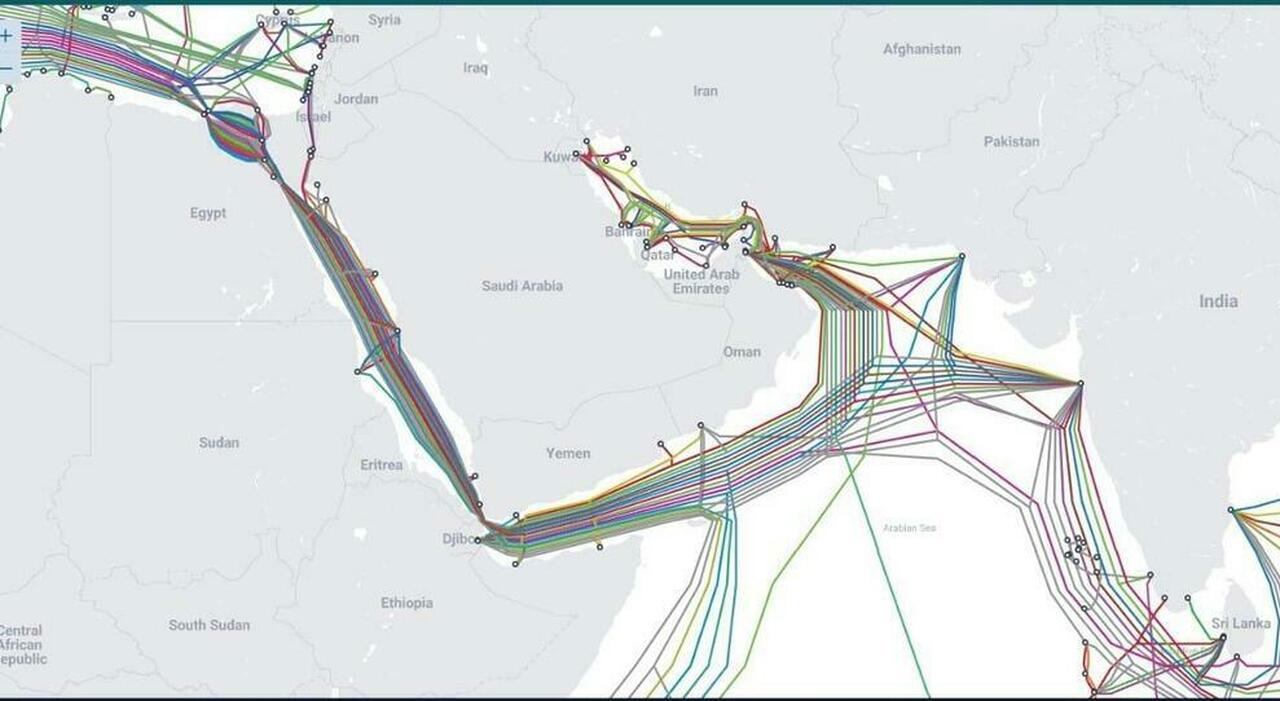The qualitative leap in the Houthi attacks on Western economies, especially European ones, passes through underwater communications cables, no thicker than a garden hose. One interruption, the most important, is enough to send data transmission between India, China and Europe into chaos. It can be an ideal, easy-to-achieve goal with unimaginable consequences. This is the fear, and also the alarm, of the Association of Yemeni Telecommunications Companies loyal to the government in exile, based on a disturbing post published on the Telegram application by elements of the pro-Iranian Houthi militia. Next to a geographical map is written: “Here are the maps of international cables that connect all regions of the world across the sea. “It seems that Yemen is in a strategic location, given that Internet lines that connect entire continents, not just countries, pass there.” Therefore, the Houthis know this. “The threat relates to one of the most important digital infrastructures in the world,” says the Minister of Information in the government based in Aden is based, Muammar Al-Eryani – and the Houthis are a terrorist group, they know no ceiling or borders.”
NATO exercise, GB HMS Queen Elizabeth aircraft carrier failure: did not depart for mission, Royal Navy had to replace it
Cables
There will be at least 16 submarine cables in the waters of the Red Sea, through which 17 percent of Internet traffic from around the world will pass, and in some parts extending only 100 meters below the surface of the water. One, in particular, risks ending up in the range of Houthi terrorists, the Asia-Africa-Europe AE-1, which has a range of more than 25,000 kilometers. “The cables have remained secure so far thanks to the relative backwardness of Houthi technology, not due to a lack of motivation,” analysts at the Gulf Security Forum wrote in a report. The rebel war with Saudi Arabia for control of Yemen was mostly land, and as a result their naval forces were not particularly advanced. But the threat is brewing. “The situation is very serious and very critical,” comments Giovanni Ottati, strategic advisor to TLC companies in Africa, member of the Strategic Steering Committee of the E4Impact Foundation and former president of Confindustria Assafrica & Mediterraneo. “Practically all submarine cables that connect India and China from Europe cross the Suez Canal and pass into the Red Sea, touching Yemen on one side and Djibouti on the other, which has become a strategic point of communications. From there the cables settle in Alexandria and Suez in Egypt, and then to the Mediterranean. There are cables that go directly from India and China to South Africa, from Malaysia and Mauritius and then across the west coast of Africa to Portugal and the United Kingdom. “However, this cable, Safe -Wasc, will end its life in the next two years. Alternatives have only recently been created: the Meta-Facebook cable, one of whose access points is in Genoa. The drawback is that this cable, Africa2Connect – Otati explains – also passes from Greece to Egypt and via the Suez Canal and then reaches Kenya, Tanzania and South Africa, so it comes back just like the ships circumnavigating Africa for the Cape of Good Hope.”
alternative
The other alternative is Google's “Equiano”, which arrives in Nigeria and Togo and heads directly to Namibia and South Africa. The problem is that it ends there. Therefore, there is a need for terrestrial cables “that pass from Mombasa in Kenya and Dar es Salaam in Tanzania, through the Democratic Republic of the Congo, and reach Angola to reconnect with the Indian cable in Luanda and Lobito.” This will be TLC's response to the Red Sea crisis. But in the meantime, Otati says, “Sabotaging a submarine cable is very easy. All it takes is a small submarine to go deep and cut the cables.” “A month passes before a recovery intervention is implemented in a war situation. Let us imagine what an interruption of data transmission services with China or India, the largest center for software assistance, could mean.”
reactions
Just yesterday, British Defense Secretary Grant Shapps acknowledged that the Anglo-American raids had not eliminated the offensive capability of the Houthis, whose intention remains “to continue to obstruct navigation in the Red Sea.” Le Monde explains that the crisis is weighing heavily on Italy, which makes 54 percent of its exports by sea, and 42.7 percent of them through the Suez Canal. “We will not be intimidated,” Foreign Minister Antonio Tajani warned, reiterating Italy’s commitment to the front line of the soon-to-depart EU Red Sea mission to protect commercial ships from Houthi attacks.
© All rights reserved

“Infuriatingly humble analyst. Bacon maven. Proud food specialist. Certified reader. Avid writer. Zombie advocate. Incurable problem solver.”


